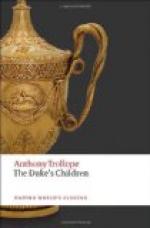’I say that Mrs Spooner isn’t very often wrong, and the Dick Rabbit isn’t very often right about a fox.’
‘It was a pretty run,’ said Phineas.
‘Just thirty-four minutes,’ said Mr Spooner.
‘Thirty-two up to Grobby Gorse,’ asserted Mrs Spooner. ’The hounds never hunted a yard after that. Dick hurried them into the gorse, and the old hound wouldn’t stick to her line when she found that no one believed her.’
This was on Monday evening, and the Brake hounds went out generally five days a week. ‘You’ll hunt tomorrow, I suppose,’ Lady Chiltern said to Silverbridge.
‘I hope so.’
’You must hunt tomorrow. Indeed there is nothing else to do. Chiltern has taken such a dislike to shooting-men, that he won’t shoot pheasants himself. We don’t hunt on Wednesdays or Sundays, and then everybody lies in bed. Here is Mr Maule, he lies in bed on other mornings as well, and spend the rest of his day riding about the country looking for the hounds.
‘Does he ever find them?’
‘What did become of you all today?’ said Mr Maule, as he took his place at the dinner-table. ’You can’t have drawn any of the coverts regularly.’
‘Then we found our foxes without drawing them,’ said the master.
‘We chopped one at Bromley’s,’ said Mr Spooner.
‘I went there.’
‘Then you ought to have known better,’ said Mrs Spooner. ’When a man loses the hounds in that country, he ought to go direct to Brackett’s Wood. If you had come on to Brackett’s Wood, you’d have seen as good a thirty-two minutes as ever you wished to ride.’ When the ladies went out of the room Mrs Spooner gave a parting word of advice to her husband, and to the host. ’Now, Tom, don’t you drink port-wine. Lord Chiltern, look after him, and don’t let him have port-wine.’
Then there began an altogether different phase of hunting conversation. As long as the ladies were there it was all very well to talk of hunting as an amusement, good sport, a thirty minutes or so, the delight of having a friend in a ditch, or the glory of a still-built rail were fitting subjects for a higher hour. But now the business of the night was to begin. The difficulties, the enmities, the precautions, the resolutions, the resources of the Brake hunt were to be discussed. And from thence the conversation of these devotees strayed away to the perils at large to which hunting in these modern days is subjected;—not the perils of broken necks and crushed ribs, which can be reduced to an average, and so an end made of that small matter; but the perils from outsiders, the perils of newfangled prejudices, the perils from more modern sports, the perils from over-cultivation, the perils from extended population, the perils from intruding cads, the perils from indifferent magistrates,—the Duke of Omnium for instance,—and that peril of perils, the peril of decrease of funds and increase of expenditure! The jaunty gentleman who puts on his dainty breeches and his pair of boots, and his single horse rides out on a pleasant morning to some neighbouring meet, thinking himself a sportsman, has but a faint idea of the troubles which a few staunch workmen endure in order that he may not be made to think that his boots, and his breeches, and his horse, have not been in vain.




